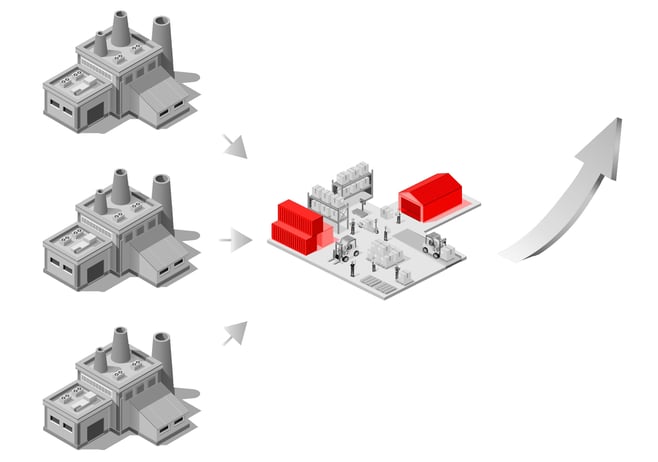It’s happened again. You’ve missed a customer’s deadline. Maybe it was close and you only missed it by a day. Or perhaps it was off by a week or more. Either way, you weren’t able to meet customer expectations, and that could be a big problem.
Your customers may be forgiving if you miss a deadline here or there. However, in a highly competitive industrial environment, many customers will quickly lose trust in you if you repeatedly miss deadlines.
The good news is that there are simple steps you can take throughout your entire process to eliminate bottlenecks and shorten your production time.
Even small changes can compound to bring big benefits.
Consider the below steps for every stage of your process, from supply chain to production to packaging and shipping. If you haven’t implemented any of these solutions, now may be the time to do so. By implementing even one of these steps, you could shorten your turnaround time, meet customer expectations, and protect your customer relationships.
1. Take the lags out of your supply chain.
It’s possible that you may fall behind schedule before you even start production. If your parts and materials arrive behind schedule, you’re already in a challenging position in the early stages of the process.
There are a number of reasons why your supply chain may not deliver as quickly as you would like. One may be that you have vendors who aren’t performing at the level you need them to. You can resolve this issue by setting clear performance benchmarks and then communicating those standards to your vendors. If they can’t meet the defined benchmarks, it might be time to look for new vendors.
We use our in-house tooling shop
to custom build packaging systems to the
customer’s needs and objectives.
You also may have a number of international vendors in your supply chain. International shipping can be time-consuming and challenging in a number of ways. You could have customs issues that hold up your shipment. Or your container could get delayed at a port of logistics facility. You could have a quality issue that forces the international vendor to resend a new order.
One solution for this issue is to establish a global supply chain hub that is central to a cluster of international vendors. Instead of having the vendors ship to your domestic facility, they ship to the regional hub. There, your team checks for quality, bundles products together, and then ships directly to you. The team can even do basic initial assembly steps so the production process can begin before the materials even arrive at your facility.
A packaging hub can save you time because it reduces delays related to quality defects and gives you the ability to jump-start the production process. You can also use the hub for storage to keep extra supplies on hand. If you need materials on a fast timeline, you can simply pull them from the hub’s inventory.
(Factory → Deufol Solution → Results)
2. Automate your packaging production.
It’s always frustrating to miss a customer’s deadline, but it’s even more frustrating when you miss the deadline because of something that isn’t related to your production process. For example, you might finish your production on-time, but then miss the deadline because the packaging isn’t ready.
If you have a packaging production process that depends on manual labor, this could happen. Manual production processes take time. Of course, many companies opt for a manual production process because they don’t want to tie up capital in a fully automated process.
There’s a middle ground, though. For example, here at Deufol, we use our in-house tooling shop to custom build packaging systems to the customer’s needs and objectives. We can build a process that requires limited investment and also semi-automates your packaging production. You can then produce packaging faster so your package is ready and waiting for your product.
3. Ship your product from your packaging partner’s facility.
Of course, another way to cut time off your production schedule is to take packaging production out of your facility altogether. You could choose to have your packages produced at your packaging partner’s facility.
 In that scenario, you would produce your product and then ship it to your packaging partner. They would then package the product and ship it directly to the customer. At first glance, this may seem like a slower process because you’re adding an additional stop into the distribution chain.
In that scenario, you would produce your product and then ship it to your packaging partner. They would then package the product and ship it directly to the customer. At first glance, this may seem like a slower process because you’re adding an additional stop into the distribution chain.
However, this arrangement could save you time in a couple of ways. First, your packaging partner will handle the packaging and shipping process. They can have those steps ready to go, so as soon as they receive your product, they simply pack it and ship. Also, they specialize in packaging, so they may be able to complete these tasks faster than your team could.
Additionally, you could even opt to store product at the packaging partner’s facility. When you receive an order, they could pull the product from the shelf, package it, and ship it. You get fast turnaround without disrupting production in your own facility.
4. Implement technology through the process.
Sometimes customers aren’t as upset about the missed deadline as they are about the lack of communication and transparency. They simply want to know the status of their shipments. If you don’t have the right systems in place, it’s hard to provide that level of support and communication.
There are a few different types of technology you can implement to get complete transparency into your process. One is GPS, which can give you and your customers real-time updates on a shipment’s location, as well as other information like temperature, vibration, and even air pressure.
You can also implement a barcode scanning system into your facility and even into your vendors’ facilities. As parts move through the process, team members can scan barcodes, providing real-time updates in an integrated system. You and your customers can get status updates with just a few clicks of the mouse. That could give you the transparency you need to take quick action if you can see that a delay is possible.
This is just a sampling of a few solutions you can implement to reduce your turnaround times and meet customer deadlines. There are many other actions you can take that can also save you time. Analyze your process and look for areas of redundancy or areas that have potential for automation. Even seemingly small improvements can have big results. ![]()







Let Us Know What You Thought about this Post.
Put your Comment Below.